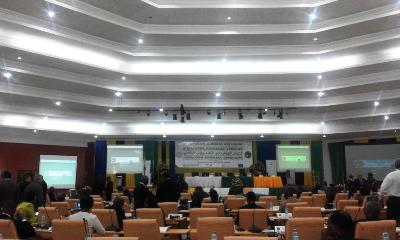EU vows to support Hybrid Court on South Sudan
November 15, 2015 (ARUSHA/JUBA) – The European Union (EU) has welcomed the recent release of the African Union Commission of Inquiry report on human rights abuses in South Sudan and vowed to support the establishment of a Hybrid Court on the world’s youngest nation.

The three-day judicial dialogue, among other resolutions, supported the idea to establish a continental network of African judiciaries under the auspices of the African Union to bring together superior courts of the African Union member states.
Both warring factions in the South Sudanese conflict committed war crimes in Juba, Bor, Bentiu and Malakal towns, the African Union Commission of Inquiry said in its report.
It however said most “indiscriminate” and “unlawful” killings of civilians or soldiers in Juba were committed by element of government security forces.
“These attacks resulted in massive killings in and around Juba. The people killed were either found during the house to house search or captured on roadblocks,” partly reads the 318-page report Sudan Tribune obtained.
The five-member commission also said there are reasonable grounds to believe war crimes of rape and torture were committed against civilians in and around Juba, citing evidences that point to state security involvement.
“The evidence collected also suggests that war crime of forced enlisting of children in the army were committed,” says the report from the commission, which was headed by former Nigerian president, Olusegen Obasanjo.
War crimes, it said, were believed to have been committed by government soldiers in Malakal Teaching Hospital through the killings of civilians by some of the soldiers within the South Sudanese national army (SPLA).
“The civilians killed were Nuers who had sought shelter at the hospital at night. About six Nuers were killed on diverse dates between 22nd January and 17th February 2014,” it said. “Some others men women and children were selected, gathered and taken to the river where they were killed”.
There are also various accounts and testimonies on killings said to have been conducted by state security agents in the South Sudanese towns of Juba, Bentiu and Bor.
The five-member commission, established in March last year and tasked to investigate the human rights violations and other abuses committed during the armed conflict in South Sudan, equally attributed war crimes allegedly committed to the armed opposition (SPLA/IO) and the white army forces allied to the country’s former vice president, Riek Machar in Bor.
The commission further considers that there are reasonable grounds to believe that war crimes in relation to massive and indiscriminate attacks against civilian property were carried out in Bor town, reads the report.
“Visible evidence of torched non-military objectives like houses, market place, administration houses, hospital, form the basis to believe that these crimes were committed,” it adds.
The commission, however, said there were reasonable grounds to believe that no crimes of genocide were committed during the mid-December 2013 conflict despite the seeming ethnic nature and dimension the violent war.
It still maintained though that some of the serious violations of human rights could amount to crimes against humanity were committed during the conflict and that further investigations be done to identify those responsible.
JUDICIAL REFORM PROCESS
Meanwhile, the commission found that the Transitional Constitution of South Sudan gives the presidency too much power amidst a weak institutions and a gap between the judiciary, legislature and the executive.
As such, it said, the South Sudanese president’s power to remove some state officials, often without proper controls, was one cause of instability in the country.
“The Commission recommends that the future Constitution should establish a well-balanced system of separation of powers with adequate checks and balances,” it said.
This, the report further noted, should be achieved through empowering and strengthening the capacity of the legislatures at both levels of government; subjecting major executive appointments to legislative approval; strengthening the judiciary (ensuring structural and financial independence from the political branches) and adherence to separation of powers, cultivating a culture of respect for judicial independence and rule of law.
The commission of inquiry recommended that appointment and removal of the country’s vice president be subjected to the approval of the legislature.
TRUTH AND RECONCILIATION
The AU Commission of inquiry, among others, recommended the establishment of a Truth and Reconciliation Commission with a mandate to investigate human rights violations dating back to the agreed cutoff date.
The peace and reconciliation process, it said, should be driven by the commission.
“Such a body should lead to truth, remorse, forgiveness and restitution where necessary, justice and lasting reconciliation being achieved,” it added and that process be established in relationship with ‘hybrid’ mechanisms.
“Such mechanisms would operate under the national mechanism, which should develop guidelines that seek to among others, align the operations of grassroots mechanisms with human rights and other identified ideals”.
The South Sudanese government said it would not shield officials found to have masterminded the killing of members of ethnic Nuer in December 2013 when political differences within the leadership of the country’s ruling party (SPLM) turned violent by spreading into the army.
“The government will not protect officials who will be found to have played roles pointing to facts and evidences that they were involved in the killing of some citizens on the basis of their ethnicity. I repeat if there are credible, reliable and empirical evidences about actions of some people, the government will hand them over to answer the cause of their actions,” justice minister Paulino Wanawila told Sudan Tribune last week.
(ST)
